-
 Polaris is a US-based anti-slavery NGO. They gather stories of survivors of human trafficking in different settings. The Typology of Modern Slavery they have created breaks down human trafficking into categories based on industry, providing solutions for tackling the crime based on the characteristics of each.
Polaris is a US-based anti-slavery NGO. They gather stories of survivors of human trafficking in different settings. The Typology of Modern Slavery they have created breaks down human trafficking into categories based on industry, providing solutions for tackling the crime based on the characteristics of each. -
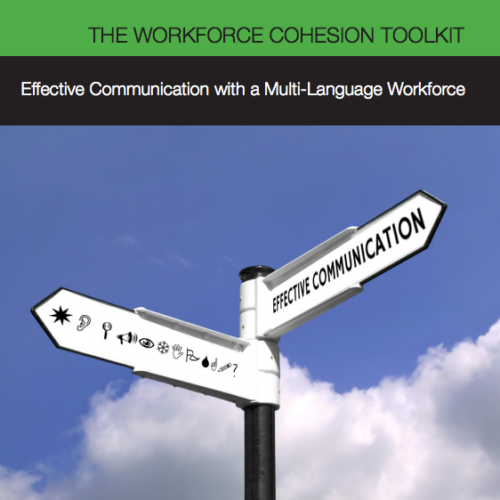 Stronger Together is a multi-stakeholder initiative which aims to reduce modern slavery. It provides guidance, training and resources to organisations, employers, labour providers, workers and their representatives. This free collection of resources includes pragmatic guidance and toolkits, and resources for the workplace including multilingual posters, leaflets and template policies. This Toolkit is intended to provide practical guidance and advice to managers on how to communicate with their workforce where more than one language is spoken. The guide is not intended to be a definitive guide, but rather gathers together advice to provide insight on how companies have successfully navigated communications issues. It includes both tips on language use and on understanding cultural difference, and illustrates practical advice through the use of case studies.
Stronger Together is a multi-stakeholder initiative which aims to reduce modern slavery. It provides guidance, training and resources to organisations, employers, labour providers, workers and their representatives. This free collection of resources includes pragmatic guidance and toolkits, and resources for the workplace including multilingual posters, leaflets and template policies. This Toolkit is intended to provide practical guidance and advice to managers on how to communicate with their workforce where more than one language is spoken. The guide is not intended to be a definitive guide, but rather gathers together advice to provide insight on how companies have successfully navigated communications issues. It includes both tips on language use and on understanding cultural difference, and illustrates practical advice through the use of case studies.Credit: ALP, The Co-operative Food, Poultec,Workforce Cohesion Alliance - shared by Stronger Together
-
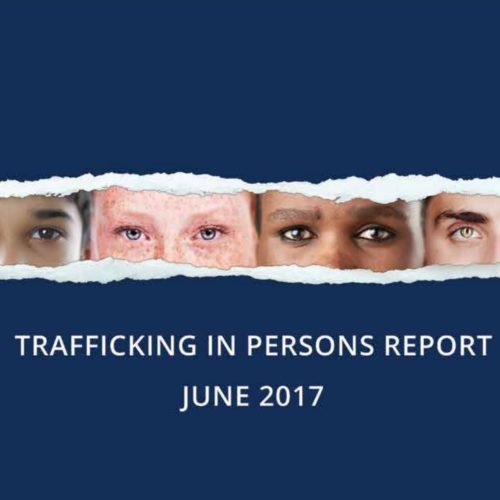 The Trafficking in Persons Report, or TIP Report, is an annual report issued by the U.S. State Department's Office to Monitor and Combat Trafficking in Persons. It provides countrywide statistics on Human Trafficking including definitions, themes and case studies. It ranks governments based on their perceived efforts to acknowledge and combat human trafficking.
The Trafficking in Persons Report, or TIP Report, is an annual report issued by the U.S. State Department's Office to Monitor and Combat Trafficking in Persons. It provides countrywide statistics on Human Trafficking including definitions, themes and case studies. It ranks governments based on their perceived efforts to acknowledge and combat human trafficking.Credit: United States of America Department of State
-
 This guide provides support for hotel owners to uphold and protect human rights in their business and understand risk areas. It includes information and case studies about risk areas, tools and instruments to help companies adhere to the law and implement good practice, and a step-by-step guide for companies to meet the responsibility to respect human rights.
This guide provides support for hotel owners to uphold and protect human rights in their business and understand risk areas. It includes information and case studies about risk areas, tools and instruments to help companies adhere to the law and implement good practice, and a step-by-step guide for companies to meet the responsibility to respect human rights.Credit: University of Liverpool
-
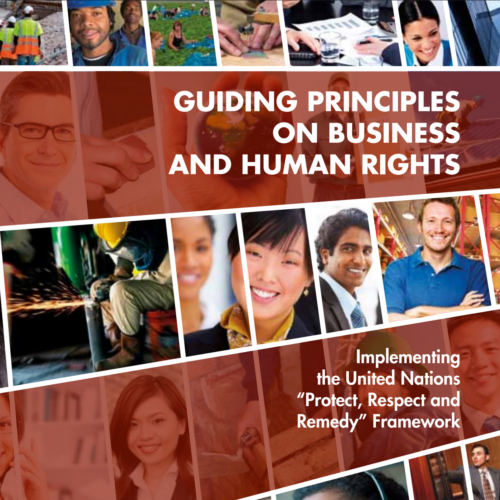 The Guiding Principles seek to provide an authoritative global standard for preventing and addressing the risk of adverse human rights impacts linked to business activity. See The Corporate Responsibility to Respect Human Rights which is the official guidance to support effective implementation of the Guiding Principles.
The Guiding Principles seek to provide an authoritative global standard for preventing and addressing the risk of adverse human rights impacts linked to business activity. See The Corporate Responsibility to Respect Human Rights which is the official guidance to support effective implementation of the Guiding Principles.Credit: UN
-
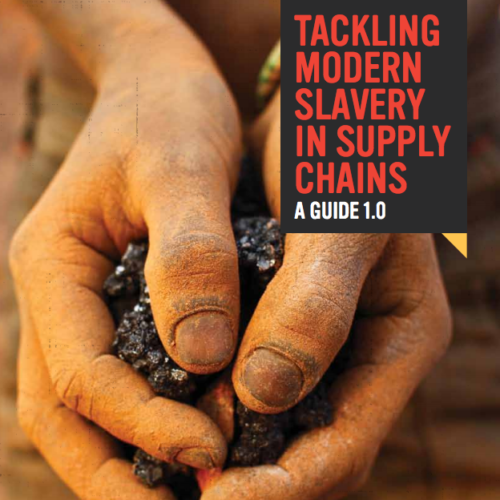 The Walk Free Foundation was established by Andrew Forrest, the Chairman of Fortescue Metals Group, after he found labour exploitation within his own supply chains and took a number of steps to prevent modern slavery affecting his business. This comprehensive guide considers corporate policy on modern slavery and provides both guidance and tools to implement it. It includes advice on corporate policy and provides template examples of a number of tools.
The Walk Free Foundation was established by Andrew Forrest, the Chairman of Fortescue Metals Group, after he found labour exploitation within his own supply chains and took a number of steps to prevent modern slavery affecting his business. This comprehensive guide considers corporate policy on modern slavery and provides both guidance and tools to implement it. It includes advice on corporate policy and provides template examples of a number of tools.Credit: Walk Free Foundation & Verite
-
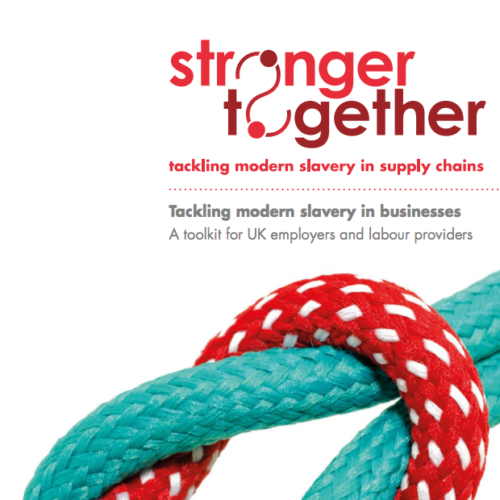 Stronger Together is a multi-stakeholder initiative which aims to reduce modern slavery. It provides guidance, training and resources to organisations, employers, labour providers, workers and their representatives. This free collection of resources includes pragmatic guidance and toolkits, and resources for the workplace including multilingual posters, leaflets and template policies. This 12 point checklist lists actions for both employers and labour providers such as corporate policy improvement, workplace awareness-raising initiatives and steps to ensure supply chain transparency.
Stronger Together is a multi-stakeholder initiative which aims to reduce modern slavery. It provides guidance, training and resources to organisations, employers, labour providers, workers and their representatives. This free collection of resources includes pragmatic guidance and toolkits, and resources for the workplace including multilingual posters, leaflets and template policies. This 12 point checklist lists actions for both employers and labour providers such as corporate policy improvement, workplace awareness-raising initiatives and steps to ensure supply chain transparency.Credit: Stronger Together
-
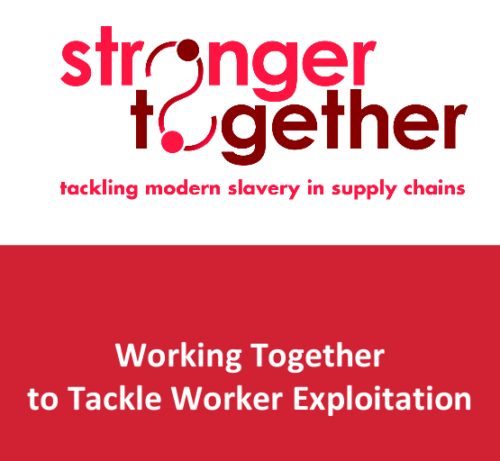 Stronger Together is a multi-stakeholder initiative which aims to reduce modern slavery. It provides guidance, training and resources to organisations, employers, labour providers, workers and their representatives. This free collection of resources includes pragmatic guidance and toolkits, and resources for the workplace including multilingual posters, leaflets and template policies. This template is to be modified as required and for inclusion with a wider Tackling Modern Slavery in Business and Supply Chain or Business Human Rights Policy.
Stronger Together is a multi-stakeholder initiative which aims to reduce modern slavery. It provides guidance, training and resources to organisations, employers, labour providers, workers and their representatives. This free collection of resources includes pragmatic guidance and toolkits, and resources for the workplace including multilingual posters, leaflets and template policies. This template is to be modified as required and for inclusion with a wider Tackling Modern Slavery in Business and Supply Chain or Business Human Rights Policy.Credit: Stronger Together
-
 Stronger Together is a multi-stakeholder initiative which aims to reduce modern slavery. It provides guidance, training and resources to organisations, employers, labour providers, workers and their representatives. This free collection of resources includes pragmatic guidance and toolkits, and resources for the workplace including multilingual posters, leaflets and template policies. This template is to be modified as required and for inclusion with a wider Tackling Modern Slavery in Business and Supply Chain or Business Human Rights Policy.
Stronger Together is a multi-stakeholder initiative which aims to reduce modern slavery. It provides guidance, training and resources to organisations, employers, labour providers, workers and their representatives. This free collection of resources includes pragmatic guidance and toolkits, and resources for the workplace including multilingual posters, leaflets and template policies. This template is to be modified as required and for inclusion with a wider Tackling Modern Slavery in Business and Supply Chain or Business Human Rights Policy.Credit: Stronger Together
-
 Stronger Together is a multi-stakeholder initiative which aims to reduce modern slavery. It provides guidance, training and resources to organisations, employers, labour providers, workers and their representatives. This free collection of resources includes pragmatic guidance and toolkits, and resources for the workplace including multilingual posters, leaflets and template policies. This template is to be modified as required and for inclusion with a wider Tackling Modern Slavery in Business and Supply Chain or Business Human Rights Policy.
Stronger Together is a multi-stakeholder initiative which aims to reduce modern slavery. It provides guidance, training and resources to organisations, employers, labour providers, workers and their representatives. This free collection of resources includes pragmatic guidance and toolkits, and resources for the workplace including multilingual posters, leaflets and template policies. This template is to be modified as required and for inclusion with a wider Tackling Modern Slavery in Business and Supply Chain or Business Human Rights Policy.Credit: Stronger Together
-
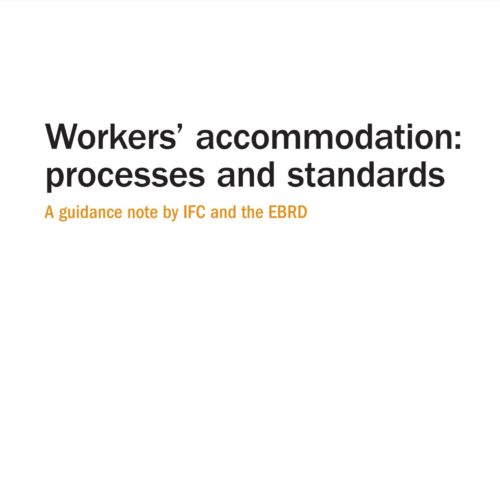 This Guidance Note is written by the EBRD, an international financial institution, and the IFC, a member of the World Bank Group, which creates opportunity for people to escape poverty and improve their lives. It is aimed at providing practical guidance to IFC and EBRD specialists, consultants and clients on the processes and standards that should be applied to the provision of workers’ accommodation in relation to projects funded by IFC or the EBRD. The Guidance Note also provides examples of good practice approaches that businesses have successfully applied in their operations.
This Guidance Note is written by the EBRD, an international financial institution, and the IFC, a member of the World Bank Group, which creates opportunity for people to escape poverty and improve their lives. It is aimed at providing practical guidance to IFC and EBRD specialists, consultants and clients on the processes and standards that should be applied to the provision of workers’ accommodation in relation to projects funded by IFC or the EBRD. The Guidance Note also provides examples of good practice approaches that businesses have successfully applied in their operations.Credit: International Finance Corporation & the European Bank for Reconstruction and Development
-
 This leaflet, created by the Heath and Safety Executive (HSE) is aimed at employers who provide work experience opportunities to young people. The HSE is the body responsible for the encouragement, regulation and enforcement of workplace health, safety and welfare, and for research into occupational risks in Great Britain. All HSE publications, whether priced or non-priced, are subject to Crown Copyright. The Government encourages the re-use of public information. Crown copyrighted material may be used and re-used free of charge in any format or medium, subject to the following conditions: An acknowledgement to the source of the Information must be provided by including the following attribution statement and hyperlink: 'Contains public sector information published by the Health and Safety Executive and licensed under the Open Government Licence v1.0'. www.nationalarchives.gov.uk/doc/open-government-licence/ '
This leaflet, created by the Heath and Safety Executive (HSE) is aimed at employers who provide work experience opportunities to young people. The HSE is the body responsible for the encouragement, regulation and enforcement of workplace health, safety and welfare, and for research into occupational risks in Great Britain. All HSE publications, whether priced or non-priced, are subject to Crown Copyright. The Government encourages the re-use of public information. Crown copyrighted material may be used and re-used free of charge in any format or medium, subject to the following conditions: An acknowledgement to the source of the Information must be provided by including the following attribution statement and hyperlink: 'Contains public sector information published by the Health and Safety Executive and licensed under the Open Government Licence v1.0'. www.nationalarchives.gov.uk/doc/open-government-licence/ 'Credit: Health and Safety Executive

